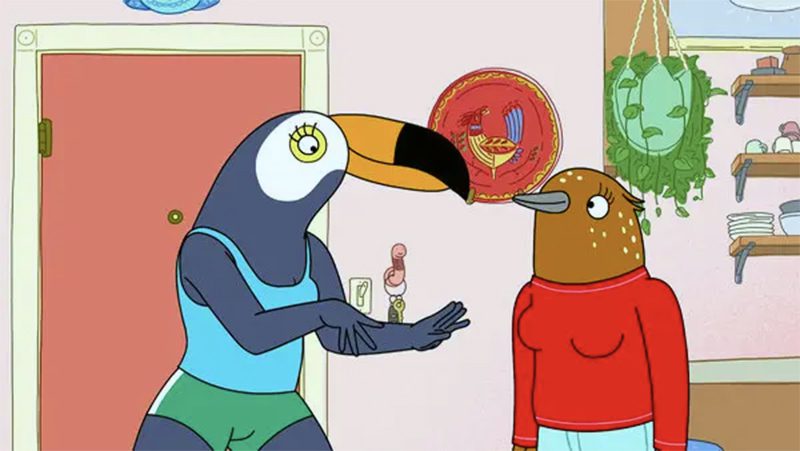‘Tuca & Bertie’: An Animated Exploration of Contemporary Womanhood

Tuca & Bertie is a Netflix animated series voiced by comedians Ali Wong and Tiffany Haddish and produced by cartoonist Lisa Hanawalt (BoJack Horseman). The series follows the titular birds’ friendship and their radically different approaches to navigating life as women. Bertie (Wong) is a mild-mannered young professional who struggles with anxiety. Bertie’s best friend, Tuca (Haddish), is a newly sober, kind, and outspoken free spirit who lives life out loud. Tuca encourages Bertie to go with the flow and be more confident. Bertie attempts to help Tuca get a bit grounded and become more responsible while maintaining her lively personality. While Haddish has some growing to do in terms of voice acting (sometimes it sounds very much like she is reading), it doesn’t detract from the show’s originality and appeal. Through visually exciting, multimedia animation that includes 2D drawings, yarn representations, and sock puppets, Tuca & Bertie offers a refreshing and delightfully unique look into sexuality, feminism, and mental health.
Tuca boldly takes hold of her sexuality and its fluidity by donning short shorts that show off her proud, strong legs. In one episode, Tuca mentions in passing that she has a tasteful crush on a partnered woman who seems in full control of her life. The way these ideas are presented and discussed in such a normative fashion and not turned into an episode-long exploration of Tuca’s sexuality offers broader representations of human understandings and expressions of sexuality. It presents sexuality as complicated – a truth, unfortunately, still in need of promotion. Sexual activity is also openly illustrated in this animated series. There is an entire episode dedicated to following Bertie’s dissatisfaction with her sex life’s monotony with her live-in boyfriend, Speckle. We watch her overcome her discomfort with discussing her true feelings around sex as she purchases books to help her spice things up. Her desire for more spontaneity in the bedroom pushes her to consider and validate her wants. This eventually leads to a conversation with her lover, Speckle; in addition to talking about her discontent, the two end up sharing porn preferences. It is empowering to watch Bertie battle the societal shame imposed on women around sex and sexuality to advocate for herself and ensure that her needs matter and are met. Part of the fun of the show is its ability to vacillate between “real-life” and absurdity. In one instance, Tuca contracts sex bugs, which she accidentally enlarges to life-size by combining too many prescriptions. She is not shamed for contracting them (even though it was from a bush) and wins a trial conducted by the Birdtown equivalent of the CDC, earning her sex bugs the right to exist and not be exterminated.
We watch Bertie deal with sexual harassment on her job and during her apprenticeship at the bakery for several episodes. At work, her co-worker, Dirk, continually makes sexual references to her body and her appearance. Bertie’s complaints about his conduct are dismissed by the seemingly airheaded HR rep, who seems to have a thing for the offender. After one particularly fowl (get it, lol) comment made by Dirk, Bertie’s left breast calls it quits, jumps off Bertie’s chest, leaving her to finish the workday with a gaping hole. With Tuca’s support, Bertie not puts an end to Dirk’s disgusting behavior; he is fired. Bertie even gains the confidence to speak up for herself in meetings and lands a much-deserved promotion. Outside of the workplace, as Bertie continues to grow more fully into her confidence, she joins a group called W.T.U.S. – Women Taking Up Space. The simplicity of this concept, women symbolically using their bodies to more fully take up the spaces they inhabit instead of shrinking from them, is dynamic. During one meeting, members drop raw potatoes in the crotch of their pants to practice manspreading. The group becomes a support system for Bertie, especially when it comes to defending herself against sexual harassment at the hands of the baker she apprentices for.
Tuca & Bertie frames their exploration of sexual harassment, sexuality, and female empowerment through the lens of mental health and how patriarchy negatively impacts it. Bertie struggles with anxiety, possibly in part due to child sexual abuse. This leads her to have days where she calls out of work because she cannot handle leaving her house. Tuca is six-months sober, her former drinking problem likely fueled by losing her mother at a young age. The cool thing about the show is that it maintains a non-judgmental lens by which we get to see the characters work through their struggles as they support one another along their independent journeys. Bertie may never permanently overcome her anxiety, but we see moments where she does, and it’s super encouraging. Tuca’s sense of responsibility may never look like what is deemed “normal,” but she continues to grow and become a better version of herself. In Tuca and Bertie, all is not perfect, but all is well.
No Comments